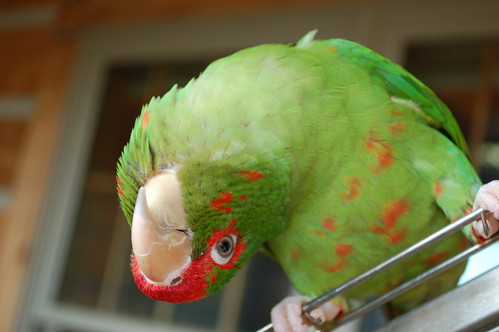
Here it comes! It’s only January!! Normally, I wouldn’t see some of the behaviors I have been noticing until well into February. Perhaps it is because of our change in location, but all the signs promising a very hormonal season are in place with my birds.
I took Theo, my goffins cockatoo, in to watch a movie with me the other day. Normally, she would be preening herself, preening my hair, untying my shoes and hopping up and down the length of my body while I try to see over her flapping wings. Instead, she was trying to crawl inside my ear. When she was buried so deeply in my neck that no air could pass between us, she started clucking like a hen and quivering like a jello mold. Back to the cage she went.
I recently gave Linus, my umbrella cockatoo, a cardboard box filled with strips of newspaper, raffia and other shreddables and wood. For the first hour, he was having more fun than it should be legal to have: tearing apart the shredders, running miscellaneous this and that up into the stainless steel bucket attached to the side of the cage, gleefully chewing away a side of the box. When I looked in on him later, the box was in the corner of his cage, upside down, the chewed side was now a doorway, and all the shreddables were lining his lovely new NEST! I removed the box and gathered up the shredders and put them in his bucket. For the rest of the day, he stayed inside his bucket, face first, with his butt sticking up in the air.
Libby, my quaker, has been nippy and moody. The cockatiels, and even Jamie and Dave’s too-sweet-for-words budgies, have been excessively vocal. Following this new schedule, I can expect to see the traditional levels of cage territorialism and aggression from Linus in about 3 or 4 weeks.

Springtime means extended daylight hours. The warmth and rain showers encourages plant growth, which means the availability of fresh foods. These are opportune conditions for breeding and with it comes a surge in hormones that tells your bird that time is right for reproduction.
There is a never ending list of strange behaviors and vocalizations that parrots exhibit when it is breeding season, and while not all birds are affected in ways that bring out aggression, it is a good idea to be cautious when you are working in and around their cages. Many birds get very territorial during this time of year and would prefer that you keep out! Since none of my birds have ever offered to clean their own cages, I still have to get in there from time to time. I move my birds into carriers and out of the room while I tend to the chores and toy replacement.
There are many things that can help with handling a hormonal bird, you can do to lessen the effects of hormones and how to keep your bird’s environment free of things that tend to stimulate the instinct to breed.

You will notice, at the beginning of breeding season, that your bird’s appetite picks up quite a lot. Even the pickiest eater seems to be more willing to to eat fresh foods during this time. TAKE ADVANTAGE OF THIS! This is a great chance to get him to eat fresh foods if he typically turns them down, and it’s the time to offer new variety to the bird who is stuck in a rut. There’s a short window of opportunity for this, so start now!
Patty Jourgensen specializes in avian health, behavior and nutrition and has been working with and caring for rescue birds since 1987.



Be the first to comment